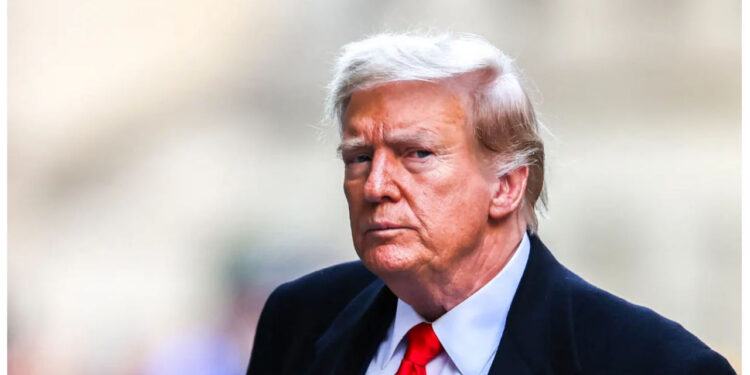Citizens for Responsibility and Ethics in Washington (Crew) is currently conducting an investigation into the dinner that took place at Trump’s club, where over 20 oil and gas company executives were present. According to the Washington Post, during the dinner, Trump requested a $1 billion contribution for his presidential campaign. Interestingly, he also pledged to reverse Joe Biden’s restrictions on natural gas export permits, oil drilling, and car pollution. Crew is actively looking into this matter.
House Democrats have initiated an investigation into the alleged offers made by Trump to oil executives.
Virginia Canter, Chief Ethics Counsel at Crew, expressed that the team’s lawyers are currently investigating a matter that has raised significant concern. Canter stated, “We are thoroughly examining whether Trump’s request for a $1 billion fundraising contribution from oil executives warrants further action.”
Canter expressed concern over the details of the conversation between the ex-president and the oil companies. He found it troubling that the discussion was limited to a specific industry and involved a small group of individuals. Furthermore, the mention of a $1 billion amount being described as a deal raises questions about the transactional nature of the meeting.
Sheldon Whitehouse, the senator from Rhode Island, is currently serving as the chair of the Senate budget committee. As the committee holds subpoena powers, Whitehouse is contemplating launching an investigation. In response to the recent revelations, Whitehouse expressed his concerns to the Guardian. He stated that Trump’s alleged commitment to dismantling fossil-fuel restrictions on his first day of a potential second term, along with the request for campaign funds, can be seen as a clear and blatant quid pro quo offer.
According to Whitehouse, the situation can be seen as an open invitation to inquire about the political corruption and manipulation of big oil. He further emphasized that his budget committee is actively exploring ways to prevent the industry from easily influencing politicians in order to burden taxpayers with the costs.
Crew has a strong history of taking legal action against Trump and his close associates. Recently, the organization spearheaded an effort to remove Trump from the presidential ballot in Colorado. They argued that Trump had violated the 14th amendment, which prohibits individuals involved in insurrection. However, their attempt was ultimately blocked by the US Supreme Court.
On his first day in the White House in 2017, Trump was sued by Crew for violating the emoluments clauses of the US constitution. These clauses prohibit federal officeholders from accepting gifts from foreign states. The case remained unresolved throughout his presidency as Trump had chosen not to divest his business interests.
More than a dozen officials in the Trump administration faced reprimands due to crew ethics complaints.
According to the bribery statute, 18 USC 201(b), public officials are prohibited from seeking or receiving anything valuable in exchange for performing an official duty. Presidential candidates, on the other hand, can request donations within the boundaries of campaign finance laws and also have the freedom to communicate their policy goals to companies that may stand to gain from them.
Once in office, it is important to note that politicians are prohibited from soliciting money directly in exchange for performing beneficial acts.
According to Professor Deborah Hellman from the University of Virginia law school, in order for the bribery statute to apply, there needs to be proof that Trump made promises to eliminate regulations in exchange for donations. She explains that if Trump were to say, “I’m doing it because you’re giving me the money,” it would be considered a quid pro quo. However, if he were to say, “I’m going to do it, so you should want me to get elected,” it would not meet the requirements for bribery.
The focus of the inquiries into the Mar-a-Lago meeting has primarily been on Trump’s conduct. However, it’s worth noting that fossil fuel companies are also facing scrutiny in this matter. According to a recent report by Politico, the US oil industry is making preparations for a potential second term for Trump. As part of these preparations, they are in the process of drafting executive orders that he could sign.
The orders would give the green light to offshore oil drilling and enhance the export of natural gas.
The non-profit watchdog OpenSecrets has compiled data from the Federal Election Commission, revealing that the fossil fuel industry has already contributed $7.3m to Trump’s campaign and groups supporting his candidacy during this election cycle.










